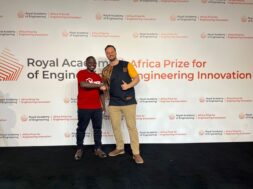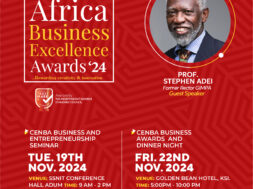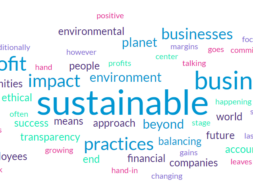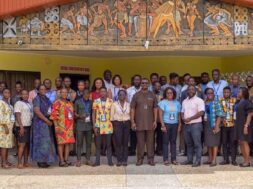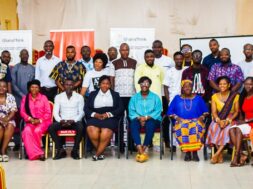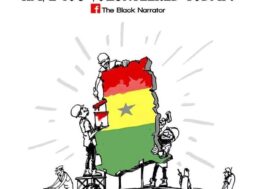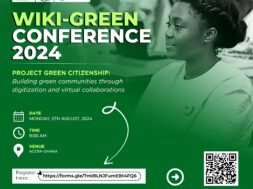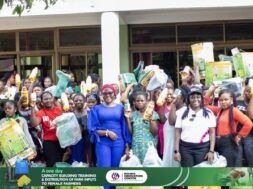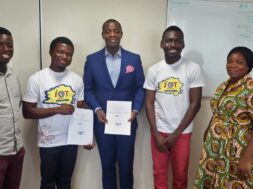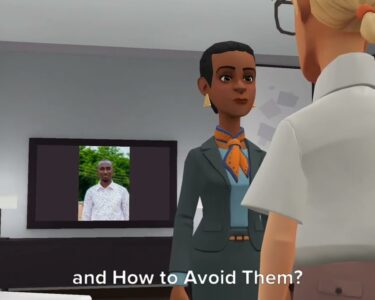South African and Ugandan Innovators Win Africa Prize for Engineering Innovation: Edmund Wessels and Anatoli Kirigwajjo Awarded £25,000 Each
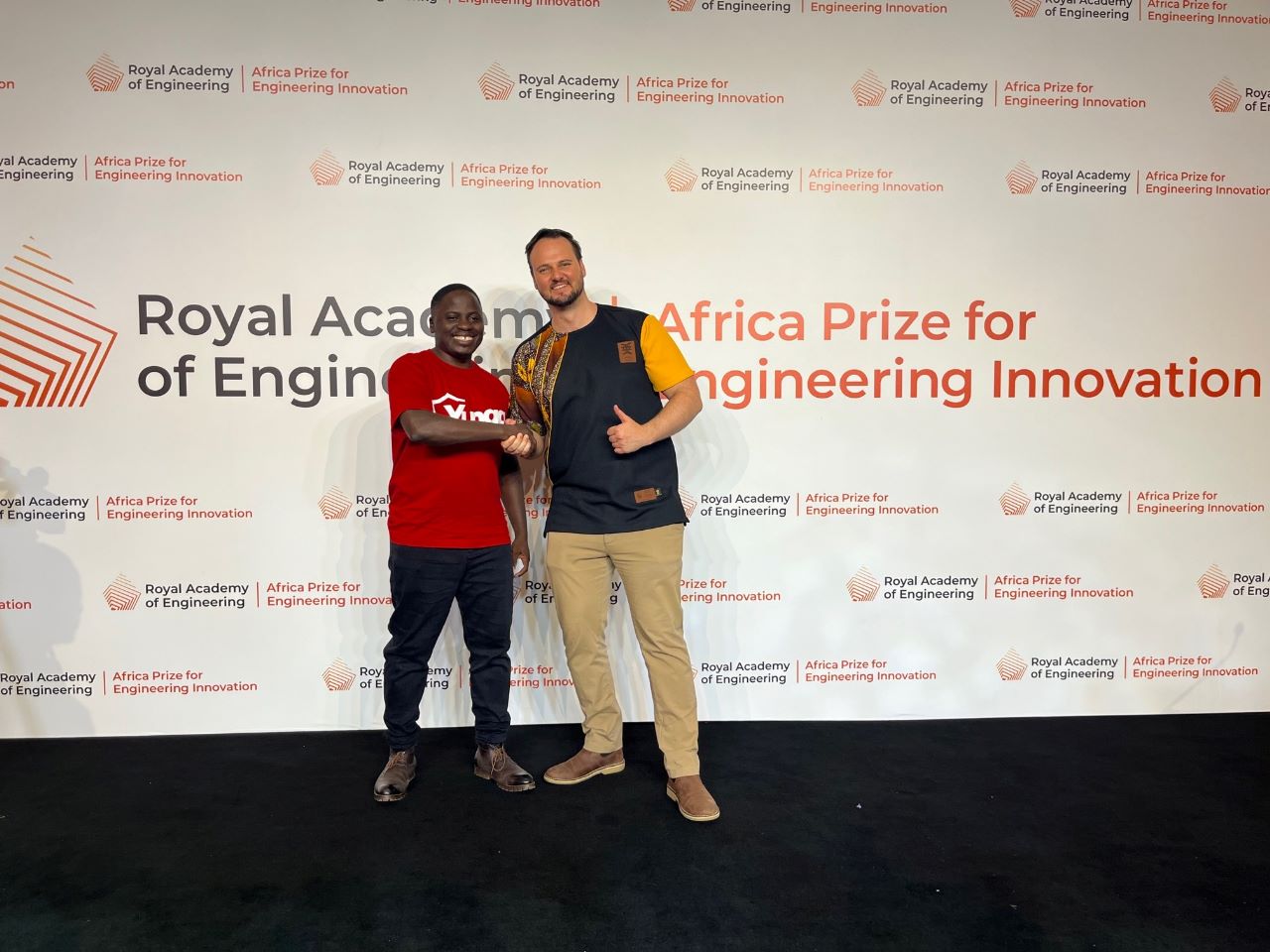
For the first time, two innovators win the Africa Prize for Engineering Innovation; South African Edmund Wessels and Ugandan Anatoli Kirigwajjo
• Wessels, the second South African to take home the award, wins with a novel device for women’s reproductive health
• Kirigwajjo, the second Ugandan to take home the award, wins with a low-cost digital security network that connects neighbours and the police
• Both innovators are awarded £25,000
• Applications are now open for the tenth Africa Prize – the deadline for applications is 25 July 2023
On 6 July 2023 – Edmund Wessels, a South African biomedical engineer, and Anatoli Kirigwajjo, a Ugandan electrical engineer, have jointly won the Royal Academy of Engineering’s 2023 Africa Prize for Engineering Innovation.
YUNGA
Kirigwajjo wins with YUNGA, a local digital security network that connects neighbours to each other and police within a 20 kilometre radius through a physical device, smartphone app or SMS service, providing security at low cost.
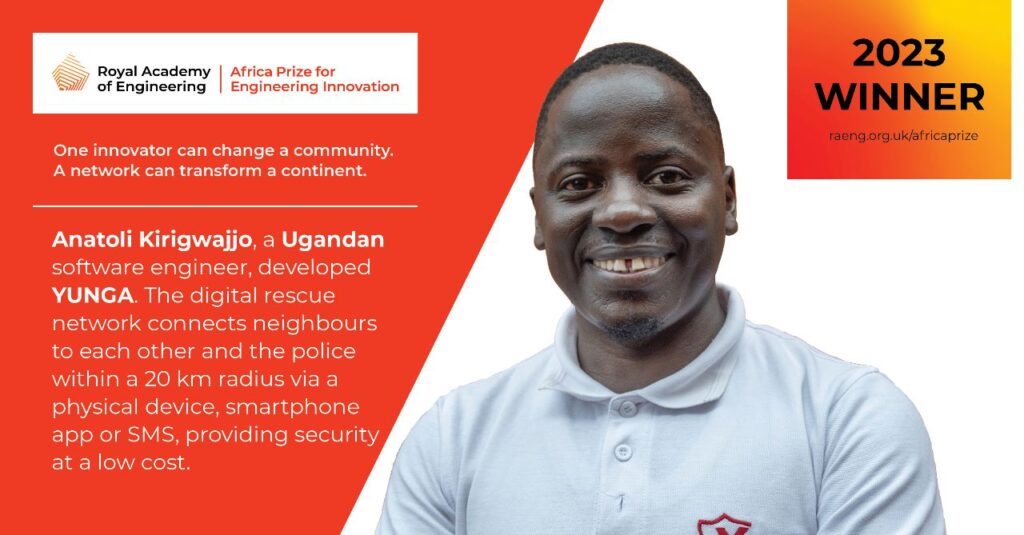
Nearly 1,000 households in 30 communities across central Uganda are already on the YUNGA network, which has successfully prevented around 130 break-ins and related crimes. The team is aiming to connect 32,000 households across Uganda in the next two years.
“I developed YUNGA after losing USD 1,300 worth of assets in a break-in, with little chance of the thieves being caught. We hope that with our household networks, communities will become harder targets for criminals. This will ensure safety, which in turn will create the space for economic activities to thrive,” says Kirigwajjo.
He and his co-founders, Kawesa Nasser and Kasoma Fredrick, say that winning the Africa Prize will give their business exposure in new markets across Africa. “It will open the door to additional resources such as investments and stakeholder partnerships. The prize money will allow us to add more than 1,000 households to the YUNGA network, with a focus on women-led homes, which are more vulnerable to crime in low-resource settings. This is an invaluable opportunity in our efforts to scale up,” adds Kirigwajjo.
In the YUNGA network, communities are divided into networks of 10 to 30 households, each receiving a device connected to a local area network. In cases of emergency, pressing a button sets off a loud alarm on all devices connected to the network, and sends a message with the victim’s details to other devices, prompting a community response. The system includes motion sensors for when users leave their homes or businesses.
YUNGA also operates in areas with no internet through a long-range wide area network. YUNGA reduces response times by hours to the shortest time possible for members of the network to reach someone in danger.
“YUNGA revolutionises communication in low-resource areas, providing a digital network for swift and efficient responses to crimes, enhancing safety for entire communities. YUNGA aims to reach more than 30,000 households and 150,000 individuals by 2025,” says Kirigwajjo.
“The Africa Prize programme has already helped us become more investment-ready, raise capital, improve and market our product, and grow our customer base by almost 60%!”
FlexiGyn
Wessels wins with FlexiGyn, a battery-powered, portable handheld device that enables gynaecologists to diagnose and treat women’s uterine problems without anaesthetic or expensive equipment. It aims to increase women’s access to reproductive healthcare, particularly in remote areas.
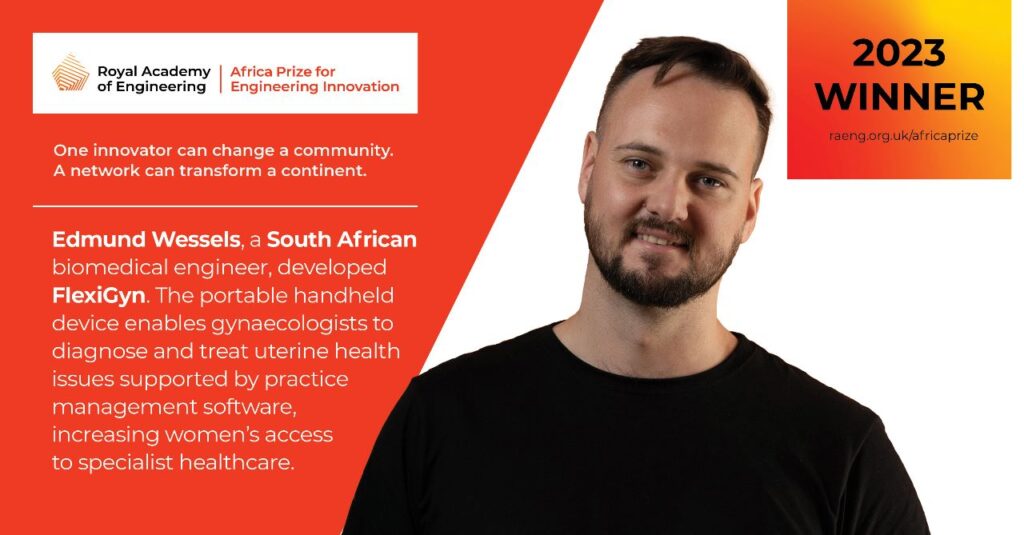
Typical hysteroscopy systems are rigid, leading to high levels of patient discomfort, requiring bulky additional equipment for visualisation. The innovative FlexiGyn features a flexible scope with built-in light and camera, offering a more comfortable and efficient experience for both patients and healthcare providers.
“My co-founder, Chris Meunier and I aim to bring healthcare to a woman’s doorstep, precisely when and where they need it. FlexiGyn is portable, intuitive and user-friendly, allowing gynaecologists to offer quality screenings and timely interventions regardless of the patient’s location or lack of medical infrastructure. At the same time, it is designed to minimise discomfort,” says Wessels.
“We are excited beyond belief to win the Africa Prize and know that this will help to get our name out and find the right partners to complete FlexiGyn’s journey.”
In addition to the hardware, Wessels and his team are developing integrated software solutions that seamlessly connect the FlexiGyn device with existing medical practice systems, including obstetricians and gynaecologists to general practitioners, radically increasing the frequency of diagnoses. Streamlining patient scheduling, electronic health record synchronisation and AI-assisted diagnosis, this improved efficiency and collaboration enables healthcare professionals to diagnose and treat patients more frequently, enhancing the overall quality of care.
“Winning the Africa Prize enhances our purpose to make women’s healthcare convenient and accessible. The more visibility we get, the more likely others will start to innovate in this space too, solving problems for the people who need it most,” says Wessels.
Africa Prize
Wessels and Kirigwajjo have each been awarded first prize for the Africa Prize for Engineering Innovation, taking home £25,000 (587,670 ZAR)/(117,240,700 UGX) to further develop their products. Four finalists delivered pitches at the awards ceremony held today in Accra, Ghana, before a panel of judges chose the winners.
Africa Prize judge Rebecca Enonchong FREng, said “Home security is an every day issue for so many people across Africa – we see huge potential for Anatoli’s innovation to transform lives and empower communities to secure their homes, so we are delighted to award YUNGA the Africa Prize. We believe Edmund’s innovation has the potential to help so many women who struggle to access reproductive healthcare, and are very pleased to award FlexiGyn the Africa Prize as well. We look forward to seeing the impact of both innovations in Africa in the coming years.”
The Africa Prize for Engineering Innovation, founded by the Royal Academy of Engineering in the UK, is Africa’s biggest prize dedicated to supporting and upscaling engineering innovation and, after nine years, has a proven track record of identifying successful engineering entrepreneurs.
Since 2014, the programme has supported more than 130 entrepreneurs across 20 African countries with a rigorous business training programme and lifelong project support through the Africa Prize alumni network. More than 70% of the alumni’s engineering and technology businesses now generate revenue. Between them, the Africa Prize alumni have raised more than USD 14 million in grants and equity funding, and created more than 3,600 jobs, almost half of them for women.
This year’s 15 shortlisted Africa Prize entrepreneurs, from 10 countries in sub-Saharan Africa, received eight months of training and tailored mentoring including support with developing business plans, recruitment, IP protection, financing and commercialisation.
The Africa Prize also promotes and connects the shortlisted entrepreneurs to individuals and networks around the world who can accelerate their business and provide support with technology development – from fellow entrepreneurs and mentors to potential investors and suppliers.
The two other finalists, who each receive £10,000, are:
• Revive Kit, Chukwuemeka Eze, Nigeria – An e-mobility service that converts gas-powered three-wheel motorbikes to run on batteries, saving up to 60% on running costs.
• WAGA PAWA Pack, Gibson Kawago, Tanzania – A power pack made with recycled laptop batteries to provide reliable and affordable power for electric bikes, power banks, solar lights, businesses and homes.
In addition to the Africa Prize, the remaining 11 innovators from the 2023 shortlist competed for the One to Watch Prize. They presented their innovations to a live audience who voted for the pitch that showed the most potential for impact. Tolulope Olukokun was selected as the winner of the Africa Prize’s One-to-Watch Award of £5,000. This Award recognises the potential of Olukokun innovation, an electric cargo bike with a battery powered fridge to help Nigeria’s smallholder farmers get fresh food crops to market. The profiles and pitch decks of the 15 engineers comprising the 2023 cohort can be viewed here.
The 2024 Africa Prize for Engineering Innovation is now open for entries. Individuals and small teams living and working in sub-Saharan Africa with a scalable engineering innovation to solve a local challenge are invited to enter. The deadline for entries is 25 July 2023 (4pm BST). Visit the ‘How to Apply’ guide on the Africa Prize website and submit applications through the online grants system.
The other 11 candidates shortlisted for the 2023 Africa Prize were:
• Affordable AMD Solution, Boitumelo Nkatlo, South Africa – A technology to treat acid mine drainage (AMD), which uses industrial waste to recycle contaminated water for human consumption.
• Aquaset, Obed Zar, Ghana – A smart water management system that monitors water levels in boreholes and water tanks, regulating the rate at which water is pumped and preventing pump breakdowns and water waste.
• Arobot, Cristovão Cacombe, Angola – A robotics learning tool for children that can be assembled and programmed to perform specific tasks.
• Digital Aquaponics, Flavien Kouatcha Simo, Cameroon – A portable fish farm that uses fish waste as a fertiliser to produce organic vegetables, enabling small-scale farmers to increase production.
• MEDBOX, Emmanuel Ofori Devi, Ghana – A healthcare monitoring system that records a patient’s vital signs and transmits them to doctors who then provide remote medical advice.
• Multi-Purpose Earth Brick Machine, Fikru Gebre Dikumbab, Ethiopia – A manually-operated portable machine to make interlocking compressed earth bricks using 90%-95% soil and 5%-10% cement.
• ProbiGal, Dr Deon Neveling, South Africa – A host-specific multi-strain probiotic designed to promote gut health and prevent bacterial infections in chickens, reducing the need for antibiotics.
• Smart Green Stove, Margaret Yainkain Mansaray, Sierra Leone – An efficient non-electric cooking device designed to reduce greenhouse gas emissions and health risks, slashing energy use by 70%.
• Smart Water Tech, Allen Chafa, Zimbabwe – A real time water quality monitoring and control system to address water borne diseases.
• ThinkBikes CoolMAX, Tolulope Olukokun, Nigeria – An electric cargo bike with a battery powered fridge to help Nigeria’s smallholder farmers get fresh food crops to market.
• Waste-to-Wealth Enhancer, Cletus Ekpoh, Nigeria – A four-part recycling system to help informal waste collectors.
